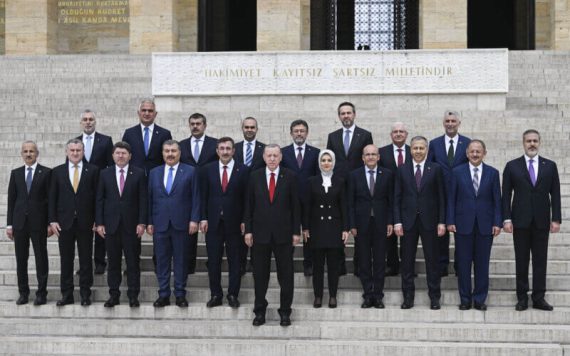T
he elections in Turkey, the most important elections of 2023 worldwide, rolled on after the May 28 runoff, with Recep Tayyip Erdoğan getting 52.18 percent of the votes against his rival, Kemal Kılıçdaroğlu, and being re-elected.
On June 3, Erdoğan attended the swearing-in ceremony at the parliament and named the cabinet members right after the ceremony, the same evening. New faces have appeared in fifteen ministerial positions except for two ministries: the ministries of health and culture. The foreign, interior, defense, and finance ministries were among the most crucial cabinet posts with new incumbents. These four vital positions have been filled by well-known, experienced, and respected politicians and bureaucrats who have played critical roles in the country’s past two decades.
The replacement of the foreign minister, Mevlut Çavuşoğlu, with Dr. Hakan Fidan, who served as the head of the National Intelligence Organization (MIT), and the assignment of Prof. Ibrahim Kalin, who served as a presidential spokesperson and advisor to Erdoğan, as the new head of Turkish intelligence have attracted the attention of not only regional powers but also international players due to the duo’s importance for the country and President Erdoğan.
Despite some analysts considering the new assignments as indicators of change, this is not the case. In the past three years, Turkey has adopted a normalization policy merged with its financial aims of attracting foreign direct investment (FDI).
The past three years’ diplomatic and economic attempts have aimed at the deliberate preparation of Turkey’s transforming foreign policy and economy. This transformation has brought about a series of hardships for the country resulting from the fall of the Turkish currency as Turkey seeks to be a regional financial hub. However, the Turkish government plans to make Turkey a “center country” as suggested by Wallerstein’s world systems theory which argues that the world economic system serves to benefit some countries and exploit others.
Turkey’s recent achievements in the defense industry (fighter jets, drones, missiles, etc.), technology, and its indigenous car (TOGG) are among the vital indicators of this intention. Rather than being exploited, Turkey wants to decrease the value of the Turkish lira, and stabilize and improve its relations with regional powers as part of its normalization efforts.
What is more, the country’s proactive role in several conflicts has brought it to the fore as a regional and international spot for resolving conflicts. Since this strategy requires a stabilized region and good diplomatic ties, Ankara, witnessing the decreasing hegemonic power of the U.S., started mending its ties with its neighbors, particularly the Gulf countries, which could impact a wide range of areas and regions, including the Maghreb.
Turkey and the Maghreb
What can be expected next in Turkey’s relations with the Maghreb countries in light of Turkey’s new cabinet?
First, it is vital to remember the fact that the newly assigned foreign minister, Hakan Fidan, has been behind the scene of Ankara’s normalization efforts with regional powers. Egypt is among the countries with which Turkey has sought normalization, and Ankara and Cairo have already announced the assignment of their ambassadors after several years of cold diplomatic ties. The normalization between Ankara and Cairo is important since it can help resolve Libya’s more than decade-long conflict, along with the disputes in the Eastern Mediterranean. Turkey’s strengthening ties with Egypt would provide Ankara with an advantage against Greece, which signed an MoU with Cairo a year after Ankara signed one with Libya’s UN-backed government.
This can also provide an opportunity to find a solution for the Eastern Mediterranean gas and border rift. Regarding Libya, Turkey has been backing the UN-recognized government headed by Abdul Hamid Dbeibah while being in touch with several parties to the conflict. On the contrary, Egypt has been one of the closest allies of warlord Khalifa Haftar, the Tobruk-based parliament’s speaker and its PM-designate Fathi Bashagha. During Bashagha’s failed attempts to enter Tripoli, Turkey played a balancing role by stopping the clashes and mediating between the warring parties.
Following the visit of CIA Director William Burns to Libya in the middle of January in which he met with Dbeibah and Haftar, Fidan was quick to take action and meet Dbeibah, Menfi, Khalid al-Mishri, the Chairman of the High Council of State, and even Sudan’s army chief Abdel Fattah al-Burhan.
Hakan Fidan
Turkey’s foreign policy during Hakan Fidan’s tenure at the MIT was a conversion of his background activities into diplomatic steps, with Ankara’s grand strategy remaining the same: making Turkey a more independent, balanced, and proactive foreign approach, considering the decreasing hegemonic power of the U.S. in the Middle East.
Meanwhile, the Gulf Cooperation Council (GCC) countries have been seen to be happy with Erdoğan’s re-election as they were among the first countries to congratulate him on his election victory. Considering the upcoming visits and meetings between Turkey, the UAE, Saudi Arabia, and Qatar, Fidan could lead Ankara towards a solution of its long-standing issues.
With an operational intelligence service, proactive foreign policy efforts, and a qualified staff comprising among others the aforementioned ministers, Turkey only needs to eliminate its economic hardships. An improving Turkish economy would also help heal the wounds of the region and the world at large. As the U.S. is losing its hegemony across the region, Turkey, after recovering from an economic and diplomatic crisis, will seek to become a regional and global hub for trade, diplomacy, and politics as per its grand strategy.
Recommended
Problem solving
Since Washington broke its promises to Turkey and relations between the two have been tense in the past few years, Ankara has learned how to steer its own ship. Following Kais Saied’s authoritarian power grab in Tunisia, Turkey, rather than directly calling it a “coup,” focused on keeping the diplomatic channels open. Following Ankara’s developing relations with Riyadh and Abu Dhabi, Turkey’s ties with Tunisia will strengthen further since the Western influence over Saied has also failed to find a solution to the country’s problems.
Rather than having reflective reactions, Turkey’s foreign policy towards Tunisia, Egypt, and Libya will mainly focus on problem solving.
The U.S. withdrawal from Afghanistan, as admitted by President Biden, is part of Washington’s strategy to focus on MENA and Africa, which are the new hot spots of struggle for power. Turkey recently opened its 44th embassy in Africa and wants to remain a powerful actor there.
This perspective requires Ankara to have deep relations with the Maghreb countries which could have an impact on the Eastern Mediterranean and Sub-Saharan Africa. Such a development disturbs France, since African countries have started looking for equal, alternative, and beneficial alliances; thus far, the EU’s strategy in Africa has been to limit Turkey’s influence considering France’s enmity towards Ankara.
By taking such bold steps towards the Maghreb countries, Turkey will seek to improve its regional ties, strengthen its presence in the continent, and fill the power vacuum through solid bilateral and multilateral ties in order to avoid the potential obstacles that could be set up by the West in the future.





